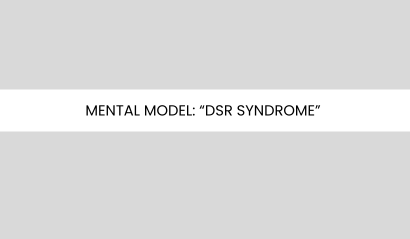Mental Model: Deprival Super Reaction Syndrome
Have you ever felt an intense emotional reaction when something you expected to have was taken away from you? Whether it’s a promotion that slipped through your fingers, a relationship that ended suddenly, or even a favorite item going out of stock, the feeling of loss can be disproportionately strong. This phenomenon is known as Deprival Super Reaction Syndrome (DSRS)—a psychological response where people react irrationally or emotionally when deprived of something they believe they are entitled to.
DSRS is an important concept to understand, as it affects our personal lives, financial decisions, and even societal behaviors. In this blog post, we will explore the origins of Deprival Super Reaction Syndrome, how it manifests in everyday life, and practical strategies to manage and mitigate its effects.
The Origin of Deprival Super Reaction Syndrome
The term “Deprival Super Reaction Syndrome” was popularized by Charlie Munger, the legendary investor and vice chairman of Berkshire Hathaway. Munger, who is a student of human psychology and cognitive biases, identified DSRS as a significant mental trap that affects individuals in various ways. He described how humans often place more weight on avoiding losses than on acquiring equivalent gains—an insight aligned with the concept of loss aversion in behavioral economics.
The roots of DSRS lie in evolutionary psychology. Our ancestors lived in environments where resources were scarce, and losing access to food, shelter, or social support could mean life or death. Over time, our brains became wired to react strongly to perceived losses, even if those losses are relatively minor in today’s world.
Understanding Deprival Super Reaction Syndrome
Deprival Super Reaction Syndrome occurs when an individual perceives that they are being deprived of something they feel entitled to, even if they were never guaranteed to have it in the first place. This reaction is often irrational, leading to emotional outbursts, poor decision-making, or even self-destructive behaviors.
DSRS is closely related to the concept of “loss aversion,” a cognitive bias first studied by Daniel Kahneman and Amos Tversky. They discovered that people feel the pain of loss about twice as strongly as they feel the pleasure of an equivalent gain. This explains why people may react aggressively when they lose something they expected to have.
Real-Life Examples of DSRS in Action
1. Consumer Behavior: The Fear of Missing Out (FOMO)
One of the most common examples of DSRS is seen in consumer behavior. Have you ever rushed to buy something during a limited-time sale, even if you didn’t really need it? Marketers exploit DSRS by creating a sense of urgency, making people feel like they are about to lose a valuable opportunity. Flash sales, exclusive offers, and “only 2 items left!” messages all trigger DSRS, pushing consumers to make impulsive purchases.
2. Gambling and Investing: Chasing Losses
In gambling, DSRS plays a significant role when people continue betting even after losing large sums of money. The feeling of losing what they previously had (or expected to win) creates an emotional response that drives them to make riskier bets to “recover” their losses.
Similarly, in investing, individuals often refuse to sell a declining stock because they feel emotionally attached to what they’ve already lost. Instead of cutting their losses, they may hold on in the hope that the stock will recover, sometimes worsening their financial position.
3. Relationships: The “Breakup Syndrome”
Have you ever seen someone react irrationally to a breakup, even if the relationship was failing? DSRS can make people act out of character when they lose a partner, especially if they felt the relationship was secure. This can lead to begging, manipulative behavior, or even resentment-driven actions, simply because they perceive the loss as unjust or unexpected.
4. Workplace and Career: Feeling Entitled to Promotions
Imagine an employee who believes they are next in line for a promotion, only to see a colleague get the job instead. Even if the company never promised the promotion, the perceived loss can cause intense emotions—ranging from resentment to reduced motivation. DSRS can lead to workplace conflicts, poor performance, or even quitting in frustration.
5. Legal and Societal Conflicts: Resistance to Change
DSRS is also visible in broader societal reactions. People often resist new policies or laws because they feel deprived of what they previously had. For example, when governments remove subsidies, change tax structures, or impose regulations, citizens may react with protests and outrage—even if the change is beneficial in the long run.
How to Overcome Deprival Super Reaction Syndrome
Understanding DSRS is the first step to overcoming its effects. Here are some strategies to manage and mitigate this psychological response:
1. Reframe Your Perspective
Instead of focusing on what you have lost, shift your perspective to what you still have or what new opportunities may arise. For example, if you miss out on a promotion, consider what skills you can develop to be a stronger candidate in the future.
2. Practice Mindfulness and Emotional Regulation
Strong emotional reactions can cloud judgment. Practicing mindfulness, meditation, or deep breathing exercises can help you stay grounded and reduce impulsive decision-making when facing loss.
3. Avoid the Sunk Cost Fallacy
People often continue investing time, money, or effort into a failing endeavor because they don’t want to “waste” what they have already put in. Learning to cut your losses and move on is crucial to overcoming DSRS.
4. Delay Major Decisions When Feeling Emotional
If you experience a strong emotional reaction to loss, wait before making any major decisions. Time provides clarity and helps separate rational thought from emotional impulse.
5. Practice Gratitude
Keeping a gratitude journal or reminding yourself of the things you do have can counterbalance feelings of loss. Focusing on abundance rather than deprivation reduces the intensity of DSRS.
6. Set Realistic Expectations
Unrealistic expectations often lead to disappointment. Before assuming that something is “yours” or “guaranteed,” assess the situation objectively and prepare for alternative outcomes.
7. Learn from Past Experiences
Reflect on past instances where DSRS affected your decisions. Identifying patterns can help you respond more rationally in future situations.
Conclusion
Deprival Super Reaction Syndrome is a deeply ingrained psychological response that can lead to irrational decisions, emotional distress, and unnecessary suffering. By understanding its origins and how it manifests in daily life, we can take proactive steps to manage our reactions to loss. Whether in consumer behavior, investing, relationships, or the workplace, recognizing and overcoming DSRS can lead to better decision-making, emotional resilience, and personal growth.
The next time you feel an overwhelming sense of loss, pause and ask yourself: Am I reacting logically, or is Deprival Super Reaction Syndrome influencing my emotions? Developing this awareness is key to navigating life’s challenges with a balanced and rational mindset.







